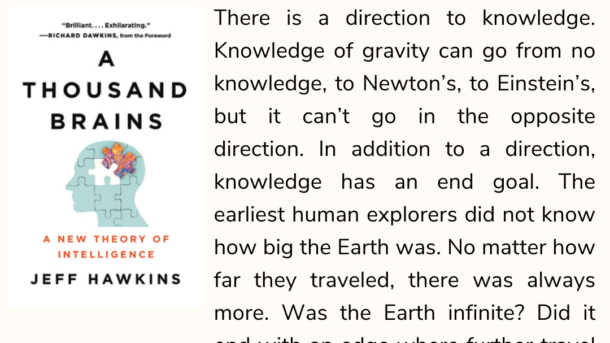Genes are just molecules that replicate. As genes evolve, they are not heading in any particular direction, nor is one gene intrinsically better than another, just as one molecule is not intrinsically better than any other molecule. Some genes may be better at replication, yet, as environments change, which genes are better at replicating also changes. Importantly, there is no overall direction to the changes. Life based on genes has no direction or goal. Life may manifest itself as a virus, a single-celled bacterium, or a tree. But there doesn’t appear to be any reason to suggest one life-form is better than another, beyond its ability to replicate. Knowledge is different. Knowledge has both a direction and an end goal. For example, consider gravity. In the not-too-distant past, nobody had any idea why things fell down and not up. Newton created the first successful theory of gravity. He proposed that it is a universal force, and he showed that it behaves according to a set of simple laws that could be expressed mathematically. After Newton, we would never go back to having no theory of gravity. Einstein’s explanation of gravity is better than Newton’s, and we will never go back to Newton’s theory. It wasn’t that Newton was wrong. His equations still accurately describe gravity as we experience it every day. Einstein’s theory incorporates Newton’s but better describes gravity under unusual conditions. There is a direction to knowledge. Knowledge of gravity can go from no knowledge, to Newton’s, to Einstein’s, but it can’t go in the opposite direction. In addition to a direction, knowledge has an end goal. The earliest human explorers did not know how big the Earth was. No matter how far they traveled, there was always more. Was the Earth infinite? Did it end with an edge where further travel would cause you to fall off? Nobody knew. But there was an end goal. It was assumed that there was an answer to the question, How big is the Earth? We eventually achieved that goal with a surprising answer. The Earth is a sphere, and now we know how big the Earth is. We are facing similar mysteries today. How big is the universe? Does it go on forever? Does it have an edge? Does it wrap around on itself like the Earth? Are there many universes? There are plenty of other things we don’t understand: What is time? How did life originate? How common is intelligent life? Answering these questions is a goal, and history suggests we can achieve it. A future driven by genes has little to no direction and only short-term goals: stay healthy, have kids, enjoy life. A future designed in the best interest of knowledge has both direction and end goals. The good news is we don’t have to choose one future over the other. It is possible to do both. We can continue to live on Earth, doing our best to keep it livable and trying to protect ourselves from our own worst behaviors. And we can simultaneously dedicate resources to ensuring the preservation of knowledge and the continuation of intelligence for a time in the future when we are no longer here.
Really liked the part where he said that knowledge has a direction, and that it can only move forward. Unlike genes, which goal is to self-replicate, knowledge has an end goal and that might be what many of us can get behind.
Final excerpt from this book, really liked this as an the end to a book about intelligence and how we need to see it as something that needs to be preserved.



